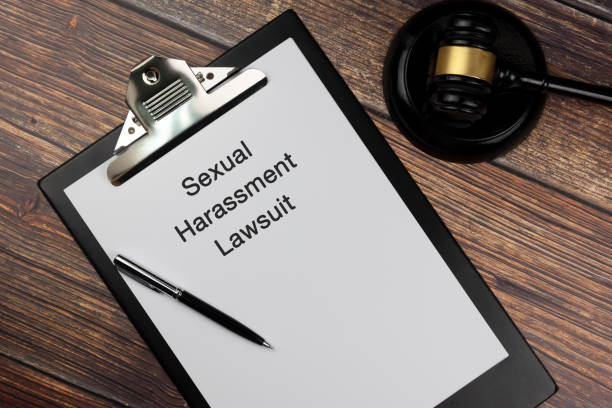
Healthy and non-toxic work practices
Respect at work is imperative to create healthy and non-toxic working conditions. The government agency, Respect@Work, industry professionals of sexual harassment in the workplace, label dissrespect as a precursor to sexual harassment.
And to be disrespectful is to be rude, insulting, and/or bad manners to those around you. Sexual harassment is inherently disrespectful as the words or actions are done in a way that makes the victim feel offended, humiliated and/or intimidated.
It is never just a joke, or just a comment. It is a sign of disrespect, and often derogatory in nature, that makes the victim feel inferior and less important than their coworkers. Therefore, to various degrees, it is everyone’s responsibility to ensure that there is respect and equality amongst all staff to prevent sexual harassment in the workplace.
Who is responsible for respect at work?
The employer has the largest legal responsibility and influence in imbedding respectful practices, add preventative measures to sexual harassment, and prevent a hostile environment. Employers are vicariously liable to protect their employees.
This means that the business itself can be found responsible for committing the sexual harassment (in addition to the perpetrator themselves) because they did not do enough to prevent the harassment from occurring. Therefore, it is in the employer and employees best interest to be up to date on sexual harassment and discrimination laws.
To prevent sexual harassment does not mean to control the actions of each employee in a business, however refers to the culture and environment of the company. The root cause of sexual harassment is not specific to a single individual. But larger issues of control and inappropriate power dynamics, gender inequality, and foundational lack of respect.
If there is a toxic, misogynistic, or bullying culture in a company then employees and authority figures become complacent in what is “right” and “wrong” behaviour. Downplaying situations that should be taken completely seriously and acted upon. And to say “that is just how it is” would be fostering and supporting sexual harassment and toxic attitudes.
No singular individual would be able to change or improve an entire culture of a workplace. Therefore, it is the responsibility of the company as a whole.

What can employers do? How do I know if my employer is doing enough?
Only 1 in 3 employees think their employer has a respectful workplace or preventative measures
There are a number of acts and checks a company can put in place to prevent sexual harassment and harbour a safe and respectful working environment. Firstly, safeguards can be placed directly into their constitution. Such as “ensuring X number of training days”, etc. This is not a formal requirement, however can show dedication to creating a respectful workplace.
The most common type of preventative action is annual mandatory training. Often done through training modules with accompanying questionnaires. This can be any combination of “respect at work”, “how to treat your peers”, or just general workplace etiquette.
Making a distinction that coworkers should often not be treated the same as outside friends to ensure respect and professionalism. Often these lines become blurred and may be difficult for an employee to navigate.
Furthermore, it is important for companies to create a safe space and avenue for communication. If there is something of concern, employees would know how to raise issues through the correct channels and procedure. And without the fear of losing their job or other repercussions.
This could be complaints that a staff member with seniority is treating an employee differently from others, micromanaging, or colleagues who are trying to talk or meet up outside the workplace. These examples may not constitute disrespectful behaviour or sexual harassment by themselves.
However, have the opportunity to head into that direction if allowed to continue. Being particularly careful in situations that may lead to irregular power dynamics or cases of inequality.

Are the power dynamics in your workplace respectful?
If you have made a complaint and are facing retaliation from your employer please contact us at 1800 333 666 for a free consultation. This is illegal under the Fair Work Act 2009 and you may be eligible for compensation.
Power dynamics are natural and important in a workplace. There is usually a need for hierarchy within a company, especially larger companies, to ensure workflow and efficiency. However, power dynamics can quickly become problematic if they are being abused.
For example, there may be a problem if an employee feels forced to contact or meet with their boss or next in charge outside of work or work hours. Or an employee is asked to complete roles wildly outside and below their job description.
For example, an assistant being asked to personally deliver their bosses clothes to their house outside of work hours when their work is purely within the office. Inappropriate tasks or drastically changing someone’s role can lead to inappropriate power dynamics that forces too much control on the subordinate. Making them feel as though they cannot say no to their superior no matter the circumstances.

Some employer intervention is appropriate
Lastly, a company should be monitoring their staff and workplaces. Usually it is not enough to complete training once and believe that employees will never make a mistake again. Additionally, every workplace and industry is different, not all preventative tactics will be effective everywhere.
Therefore, companies should lightly monitor staff relationships and behaviour in the office. This may include monitoring emails for keywords. Pulling aside employees who are in relationships with colleagues to ensure everything is consensual and above board. Or organising meetings with employees who display disrespectful behaviour without waiting for a complaint first.
If there seems to be an issue of disrespectful or sexualising behaviour then the company needs to respond appropriately. There may be a written policy found somewhere in a desk that was created 3 years ago.
However, if it is not regularly updated and reflected upon then it is not effective. And most courts will not view that as taking proactive measures. While these suggestions are not exhaustive, it can be a start in understanding if you are in a respectful and safe workplace.
What can employees do?
1.7 million Australians were sexually harassed in 2021-22
As employees there are a number of ways to help keep a respectful workplace and aid in the prevention of sexual harassment. First, is to limit the use of gendered language and stereotypes. And correcting others that use similar language.
Gendered language can include phrases such as “babe”, “love”, “sweetheart” or “stud”. While some people can find the terms endearing, depending on who is saying it and in what context there can be harmful connotations.
Gendered terms can be a more subtle way to disrespect someone and their authority. Typically used against women to make them feel inferior but is not limited to women. Additionally, for most situations there is no reason to refer to someone’s role and gender.
They are not a police woman, or female CEO. They are just a police officer and CEO. Inclusive and general language ensures no one feels unnecessarily excluded or inferior. Respectful language will help create respectful workplaces.
Don’t be a bystander
Another step is to report or bring attention to disrespectful or sexually harassing behaviour when possible. It may be easier to stay quiet about uncomfortable situations at work, however speaking up is necessary for change.
This is relevant to the victims of disrespect and colleagues who witness it. According to the Australian Human Rights Commission “1 in 10 Australians have witnessed sexual harassment in the workplace”.
Fortunately, the majority of witnesses do act in response to the inappropriate behaviour. It is always recommended to escalate the matter to a more senior staff member. However, depending on a person’s authority, they may speak directly to the perpetrator to cease the behaviour then and there.
There is legislation to protect employees who complain of inappropriate, disrespectful or bullying behaviour. Every employee has the right to feel safe at work and should not be punished for enforcing those rights.

When employers do not do enough
The following case, Oliver v Bassari [2022] VCAT 329, discusses the importance of employers placing reasonable preventative measures against sexual harassment. In 2018, an employee was working as a Beauty Therapist for 10 months. During her employment she was a victim of sexual harassment by a male coworker. Who would be verbally and physically inappropriate. The employee was forced to resign as a result of the coworker.
The employee filed a claim in the Victorian Civil and Administrative Tribunal. Claiming that her employer was in breach of section 109 of the Equal Opportunity Act 2010 by not taking steps to prevent the sexual harassment. Furthermore, the perpetrator had contravened section 93.
The employer admitted that the employee had complained of the sexual harassment 6 and 3 months prior to her resignation. The employer tried to argue that they responded to her complaints immediately by advising the offender not to physically touch employees and to respect everyone.
Employee wins against their employer
The Victorian Tribunal found that those instructions were “manifestly inadequate”. The employer had chosen to place the responsibility on the employee rather than taking responsibility themselves. It was the employer’s responsibility to implement preventative measures so that employees would not contravene sexual harassment laws.
As is the law across all of Australia. Such as Queensland, where employers must take “reasonable steps” to prevent above incidents from happening. After the first complaint the employer could have investigated the matter, or provide further training and disciplinary action.
The employee was awarded $150,000 in damages. This case is another reminder for employers to ensure policies are written and up to date. Somewhere that is easily accessible. Furthermore, to react when employees complain of inappropriate behaviour. Doing nothing at all will never be the solution to preventing and aiding instances of sexual harassment and disrespect.

Updated legislation that affects employees
New legislation has made it easier to identify an employer’s responsibility to prevent hostile work environments and prevent sexual harassment. Through the recommendations of the Respect@Work Report amended legislation has been added to the Sex Discrimination Act 1984 (Cth).
National legislation will force companies to take “positive duties” toward eliminating sexual harassment and victimisation. Therefore, there must be proactive measures to prevent the inappropriate behaviour occurring rather than reacting to it after the fact.
Furthermore, the change has allowed for the Australian Human Rights Commission to have greater regulatory power. Allowing them to investigate companies that may be infringing on these new requirements. While the legislation was agreed upon in December 2022.
The Commission agreed that employees and employers would need time to implement proactive measures to comply with these new rules. Therefore, the new legislation had not commenced until December 2023.
Fortunately, the new change has been taken seriously and cases are already making their way through the legal system. They show great prospects of harsher punishments against companies that turn a blind eye and the perpetrators of sexual harassment. Overall, there are promising developments in the pursuit of eliminating disrespectful and hostile workplace culture that would typically feeds into situations of sexual harassment.
Its not hard to have respect at work

Sexual Harassment Australia’s team will help you stand against harassment to protect and empower yourself. You have the right to work in a safe and comfortable workplace. We have helped so many people and took stand against the harasser. If you are unsure if you are a victim or how to move forward let us help you. We are proud of our staff and the outcomes we have got for our clients. Every information that you provide them will stay confidential. It is a great initiative for harassment and bullying victims.
Contact us at 1800 333 666 now for a free consultation.













